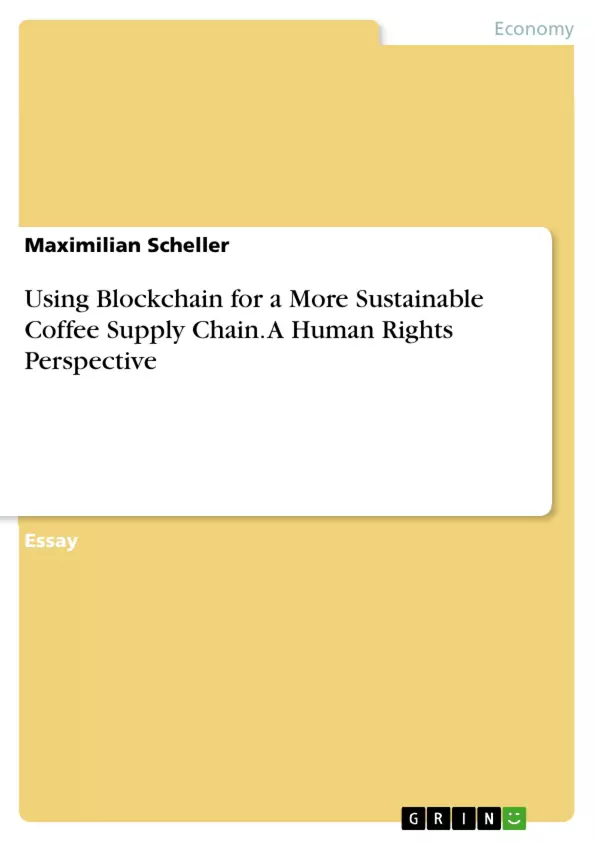This essay explores the question of how digital technologies can help to solve human rights abuses in the coffee supply chain. First, a brief outline of the coffee supply chain is given as an example. Then, in a second section, the prevailing problems and hurdles in coffee production are illustrated. The third section then looks at possible solutions. Besides a brief mention of the new German supply chain law, blockchain technology is presented as a possibility for a more sustainable supply chain in the view of a human right perspective. In conclusion, the final chapter draws upon the entire topic and summarizes the discussed points.
Coffee is one of the most consumed beverages in the world and is considered one of the most important goods in world trade. Thereby, coffee is one of the most traded commodities after oil. Every year, around 168 million bags of green coffee are harvested and sold worldwide. According to estimates, there are about 12.5 million coffee plantations worldwide. A total of about 25 million people are involved in coffee cultivation, processing and trade. 74 percent of the coffee grown worldwide is exported. The largest exporter of green coffee is Brazil with a market share of 40 percent.
The coffee industry is worth 200 billion dollars. However, only less than 10 percent of the money remains in the producing countries. As the coffee industry is one of the so-called buyer-driven businesses, the difference in distribution is very strong. Smallholder farmers in particular have a small share and face particular challenges. But how can these inequalities be adjusted? How can the supply chain be made sustainable and fair?
Inhaltsverzeichnis (Table of Contents)
- The Coffee Supply Chain
- Supply chain problems
- The German Due Diligence Law as a remedy?
- Blockchain technology as a possible solution
Zielsetzung und Themenschwerpunkte (Objectives and Key Themes)
This essay examines the use of digital technologies to address human rights abuses within the coffee supply chain. It provides an overview of the coffee supply chain, highlights the prevalent problems and challenges in coffee production, and explores potential solutions. The essay concludes by summarizing the key points discussed, focusing on blockchain technology as a promising solution for a more sustainable and equitable supply chain.
- The complex nature of the coffee supply chain and its dependence on a global network.
- The human rights issues facing coffee producers, including poverty, child labor, and unfair wages.
- The challenges of environmental sustainability in coffee production, including deforestation, pesticide use, and water pollution.
- The potential of digital technologies, particularly blockchain, to improve transparency, traceability, and accountability in the coffee supply chain.
- The role of regulations such as the German Due Diligence Law in promoting responsible practices within global supply chains.
Zusammenfassung der Kapitel (Chapter Summaries)
- The Coffee Supply Chain: This chapter provides a simplified overview of the coffee supply chain, outlining the various steps from cultivation and harvesting to consumption. It highlights the significant role of smallholder farmers and the challenges they face in accessing markets and fair prices.
- Supply chain problems: This chapter delves into the various problems and human rights abuses prevalent in the coffee supply chain. It explores issues such as child labor, unfair wages, and environmental degradation. The chapter emphasizes the vulnerability of coffee producers and the need for systemic change.
- The German Due Diligence Law as a remedy?: This chapter explores the potential of the newly adopted German Due Diligence Law to improve conditions within global supply chains. It discusses the law's requirement for companies to ensure human rights compliance within their supply chains and its potential impact on the coffee sector.
Schlüsselwörter (Keywords)
The main keywords and focus topics of this text include human rights abuses, coffee supply chain, digital technologies, blockchain technology, sustainability, transparency, traceability, due diligence, and the German Supply Chain Act. These concepts encapsulate the primary concerns and potential solutions discussed in the essay, highlighting the need for improved ethical and sustainable practices within global coffee production.
Frequently Asked Questions
What are the main human rights issues in the coffee supply chain?
The essay highlights issues such as poverty among smallholder farmers, child labor, and unfair wages within the global coffee production network.
How can blockchain technology help solve these problems?
Blockchain can improve transparency and traceability, allowing consumers and companies to verify fair practices and ensure accountability throughout the supply chain.
What is the German Due Diligence Law?
It is a regulation that requires companies to ensure human rights compliance and environmental standards within their global supply chains.
Why do smallholder farmers receive such a small share of the profit?
The coffee industry is often buyer-driven, meaning large corporations hold most of the power, leaving producers with less than 10% of the industry's total value.
Which country is the largest exporter of green coffee?
Brazil is the largest exporter of green coffee, holding a market share of approximately 40 percent.
- Arbeit zitieren
- Maximilian Scheller (Autor:in), 2022, Using Blockchain for a More Sustainable Coffee Supply Chain. A Human Rights Perspective, München, GRIN Verlag, https://www.grin.com/document/1359349



